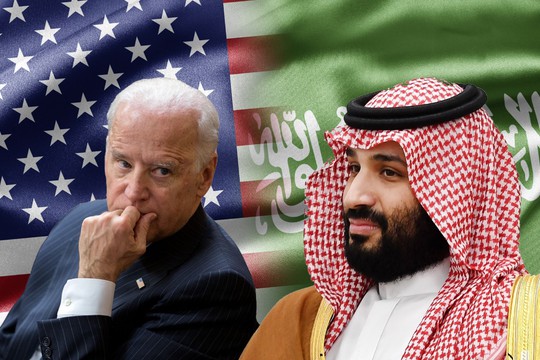Joe Bidem with Mohammed Bin Salman.
Photo: Albawaba.com
Crown Prince Mohammed Bin Salman has signaled, he is prepared to go it alone without the help of the United States to pursue Saudi interests, whether it means re-establishing ties with U.S. adversaries like Iran, or removing supplies from the oil market and angering consumers, Reuters’ comment say.
The strategy is designed to create conditions enabling Saudi Arabia to focus on Prince's vast economic transformation plan ‘Vision 2030’, in which he has poured hundreds of billions of dollars, hoping it will open the conservative Kingdom to business and tourism amid rising regional competition.
The strategic shift began in 2019 after the devastating attacks on Saudi Aramco's oil facilities – after which Riyadh questioned U.S. security commitments to the region – and gained momentum after Israeli attacks on Iranian targets, analysts say.
"Saudi Arabia is moving from disengagement towards engagement to allow it to focus on pushing ahead on ‘Vision 2030’," said Saudi analyst Abdulaziz Sager.
The Kingdom has gone into diplomatic overdrive, restoring relations with Iran and agreeing to a rapprochement with Syria in its quest to rebuild regional alliances, instead of leaning entirely on the United States, its long-time big power ally.
Saudi Arabia is planning to invite Syrian President Bashar al-Assad to an Arab League summit that Riyadh is hosting in May, three sources familiar with the plans have said, a move that would formally end Syria's regional isolation.
The Kingdom also announced a decision to join the China-led Shanghai Cooperation Organization, a sign that it is cultivating a long-term relationship with Beijing at the expense of the United States.
The Saudi-led Organization of the Petroleum Exporting Countries and their allies including Russia (OPEC+) announced further production cuts of about 1.16 million barrels per day (bpd), drawing U.S. disapproval.
The Gulf Research Center, a Saudi-based think-tank, said the OPEC cuts show major oil producers can free themselves from U.S.-Western pressure and pursue an independent policy that puts their national interests first.
Riyadh's growing ties with Beijing have raised security jitters in Washington, which says Chinese attempts to exert influence around the world will not change U.S. policy toward the Middle East.
White House national security spokesperson John Kirby said Riyadh remains a ‘strategic partner for Washington’ even ‘if the two did not agree on all issues’. Washington and Riyadh are working on addressing common security challenges, he said.
Shadi Hamid of the Brookings Institution in Washington said Saudi Arabia's view that the U.S. is increasingly disengaged from the region is not entirely wrong.
read more in our Telegram-channel https://t.me/The_International_Affairs

 10:03 07.04.2023 •
10:03 07.04.2023 •























